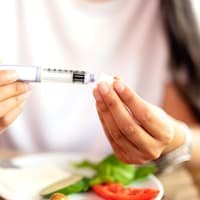
When are cholesterol levels too high?
It is fundamentally important to know that every body needs cholesterol as a vital, fat-like natural substance , for example for metabolism or the formation of certain hormones. In the blood, cholesterol is transported in small packets to its intended destination with the help of other elements. There are two main types:
- LDL: LDL (low-density lipoproteins) is also known as bad cholesterol, as an excess leads to deposits in the blood vessels.
- HDL: The good HDL (High Density Lipoproteins) can be simply described as a "cleaner", as it transports excess cholesterol to its breakdown site in the liver.
According to the current definition of hypercholesterolemia (lipid metabolism disorder with elevated cholesterol levels), cholesterol levels are often too high in Germany. The occurrence becomes more frequent with increasing age. The following limits (in milligrams per deciliter; mg/dl) should generally not be exceeded or fallen below:
- Total cholesterol: values above 200
- LDL cholesterol: values above 130
- HDL cholesterol: values below 40 for men and below 50 for women
The cholesterol risk test makes it possible to find out whether your own cholesterol level may have a negative impact on your cardiovascular system. However, the likelihood of a disease also depends on other factors such as family history.
How can you tell if your cholesterol levels are too high?
An elevated cholesterol level usually does not cause any symptoms and therefore often goes unnoticed for a long time. Only very high levels sometimes cause visible, yellowish deposits directly under the skin. This often affects the eyelids and the Achilles tendon. Occasionally, a light-colored border around the iris also indicates that the cholesterol levels are too high.
The actual determination of the cholesterol level is carried out via a blood test by a doctor. The laboratory then usually measures the concentration of LDL and HDL cholesterol as well as the total cholesterol value.
Where does an elevated cholesterol level come from?
In general, personal lifestyle has a considerable influence on cholesterol levels. If LDL cholesterol is too high, this is often due to
- an unhealthy diet,
- insufficient exercise,
- obesity or
- smoking
are often responsible. There is also a hereditary factor, as some people are generally more susceptible to a metabolic disorder during the course of their lives from birth. Experts refer to this form as non-familial hypercholesterolemia.
Some diseases can also have a negative effect on cholesterol levels. These include diabetes mellitus, hypothyroidism or rheumatism. Certain medications such as cortisone-containing drugs also cause a rise in blood cholesterol from time to time. In women, hormone status during pregnancy or the menopause can sometimes lead to increased levels. If these are the underlying causes, doctors speak of secondary hypercholesterolemia.
An inherited metabolic disorder with very high LDL cholesterol is rather rare.1 Familial hypercholesterolemia develops in childhood due to an altered gene.
What can be done if cholesterol levels are too high?
If you do something good for your LDL cholesterol, which is too high, you will also have a positive effect on your cardiovascular health. The great thing is that every person has a number of ways to positively influence their cholesterol levels. The following tips are just a few examples:
- healthy, low-fat diet: plant-based products are preferable to animal products. In addition, plenty of vegetables, fruit, nuts and wholegrain products should be on the menu. Experts often recommend so-called Mediterranean cuisine as a cholesterol-friendly diet.
- plenty of exercise: An active daily routine is ideal for this, for example taking the stairs instead of the elevator. Sports such as walking or cycling are also a good way to get regular exercise.
- Reduce excess weight: If you make sure you eat a balanced diet and are sufficiently active, you will generally maintain a healthy body weight.
- Avoiding unhealthy stimulants: Smoking cigarettes and drinking alcoholic beverages frequently has a negative effect on health and should therefore be avoided.
In some cases, taking cholesterol-lowering medication can also be helpful. Whether this is necessary and sensible depends, among other things, on which and how many other risk factors for heart problems are present. Those affected should always decide this together with their doctor.






